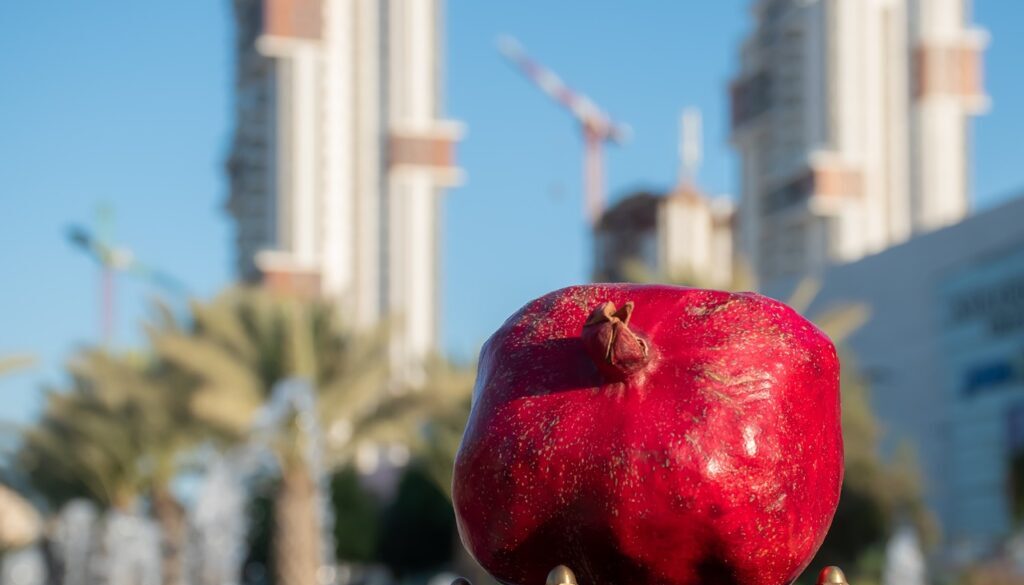Elul Sermon #1
We bring ourselves into this preparatory month of Elul, at the threshold of the holy Season of the Yamim Nora’im, the Days of Awe. The summer weather is cooling and nearly imperceptibly, we notice the shift in light—it seems like all of Creation is in the season of turning.
There are a great number of paradoxes and complexities about this time of year. On the one hand, it is a happy time—a time of family and feasting, of meals and apple picking. On the other hand, it is a time of introspection, sometimes quite heavily. When I found myself teaching about the High Holidays at the Seniors’ Brunch earlier this week, I asked the participants to say a word that the season prompted in them. One person very insightfully said: ‘dreadful’. As in, the High Holidays are full of dread. The paradox of the High Holiday season is that they take on the quality of what we bring to them: our fears, judgments, anxieties. Joy, celebration or release.
Another paradox is that this is the time of year when most Jews and their families attend synagogue. There is an anticipatory mood; some have the custom of buying something new and wearing it for Rosh haShanah. Others polish their family silver, brush up on their brisket recipes. The fact of the matter is, however, that the season is distinct, sui generis and difficult to penetrate for the occasional observer. In other words, it is the marathon of Jewish liturgy, and I don’t know about you, but I wouldn’t attempt a marathon cold. I couldn’t even complete a 5k run if I tried.
The High Holidays feel topsy turvy, upside-down in some way. They can amplify our hope or our inadequacy. The machzor projects back on us any question or protestation we may have of the Divine. We are inscribed and sealed, we die by fire or by water, we collectively atone for a myriad of sins we may or may not have committed—it is no wonder that many people struggle with this time of year.
As your rabbi, I was so conscious of this last year. It was the first year of our reopening and I was both eager to welcome people back as well as prepare us for the expected jitters of returning. It was a strange, new dynamic to navigate. This year may feel less liminal in that regard but every year, the High Holidays call out to us and insist on us examining our hearts. It’s a tough job. And it’s okay to have deeply conflicted feelings about this season. The question is: to what degree does this season speak to our lived experience as moderns? What can we take away from ancient ritual and archaic metaphor, from timeless form and unbound existentialism? What truth, beauty and wisdom can we find in it—and in our Judaism more broadly?
I was struck by a verse in this week’s Torah portion, Shoftim. The portion is all about appointing magistrates and pursuing justice. It’s a lawyer’s favorite parashah and it certainly belonged to the late and great Ruth Bader Ginsburg: ‘tzedek, tzedek tirdof’, ‘justice, justice you shall pursue.’ Yet, embedded within the text was a curious nugget. Delineating the rules of responsible Isrealite kingship, the king finds himself limited: he (and yes, it was a he) may not amass too much gold, wives or horses. And then the curious nugget itself: ‘bilti ram levavo me’eichav’ – ‘he is not to raise his heart above his fellows.’ It’s a unusually poetic turn of phrase but one we know from the Machzor where it gets cast as ‘al chet shechatanu levanecha… ramot eynaim’, for the sin we have committed for the ‘raising of our eyes’—in other words: haughtiness or arrogance.
Why should an Israelite king – or other type of leader – not be arrogant? Well, arrogance is never a commendable quality though a tempting one. The Ramban – Nachmanides – suggests that conceit prevents the king not only from seeing his subjects as his moral and ontological equals but it also bars him from seeing the God’s eye perspective. Our arrogance blinds us to finding our place in the universe. Perhaps it is an idolatry of the heart. We lose the very perspective we seek out this holy season, despite its baggage and triggers. The abiding truth that we are part of a much, much greater whole.
This is the season to trim away the callouses of our hearts. To open ourselves a little; to take spiritual risks. To soften the hard edges of ourselves and to relativize and reduce our power we have over others. The claim and meaning of monotheism is not the worship of one God for its own sake, but that this is a signal of a deep knowing of our own smallness. Not as a humiliation or degradation, but as an elevation of our spirit as golden, glowing speck of dust in the great wind of life. Not even the most powerful man (and sigh, yes, it is a man) is exempt from seeing himself as fleeting as the withering grass.
We balance these things, this season. Our High Holiday theme this year is ‘Ashreinu’, how blessed or how fortunate are we. We are going to be leaning deep into Jewish joy, uncover it and savor it, delight in our heritage and be inspired in our mission. But before we can do that, we need to down the tools of our own self-regard and crack open our souls, so that truly, the light can get in.
It’s a little scary, and a little weird. And we might all be a bit rusty. But we will do this together and in it, we will find release and healing, hope and love, and the great joy of knowing to Whom we truly belong.


